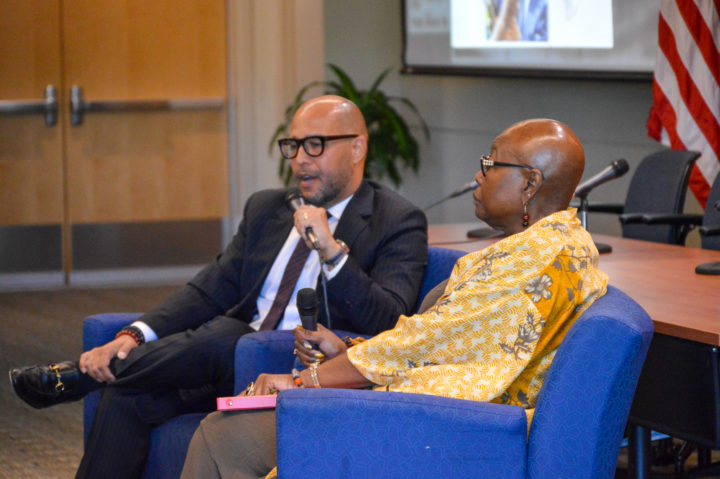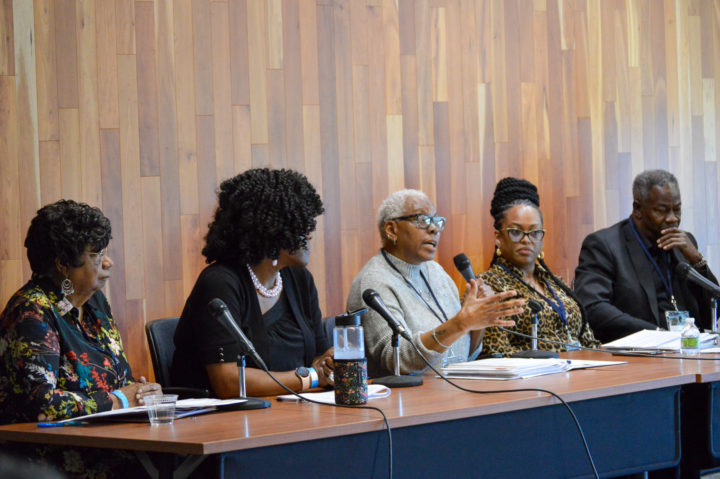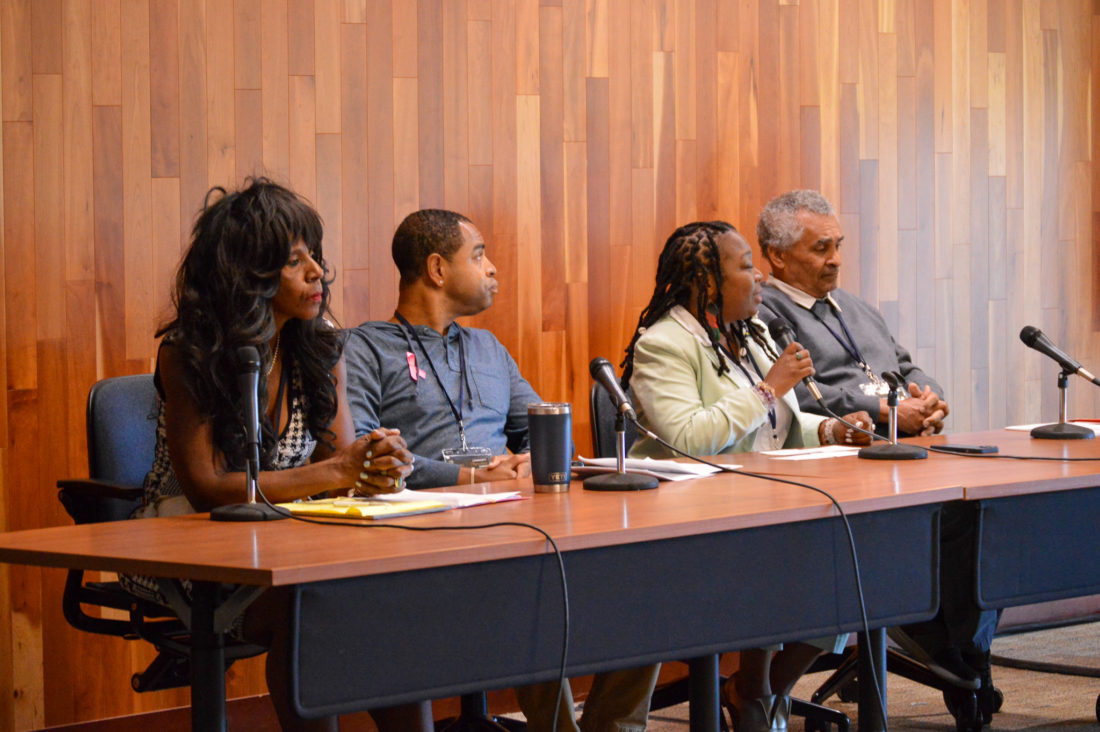After 18 months of meetings and nearly $500,000 spent, Asheville’s reparations commission — tasked with making recommendations for restitution for generations of racial injustice — has now lost its second project manager in a year.
Christine Edwards of Charlotte-based firm Civility Localized, who has been project manager for the commission since November 2022, announced Oct. 16 she is stepping down from her role managing the strategic direction of the commission and acting as liaison between the commission and government entities. She will remain on to assist with administrative duties, such as payroll, as part of the contract with Civility Localized.
“While it has been an incredible honor to be a member of this effort, it’s become evident that through these several months that my involvement is not having the intended impact on the forward movement of this very important work,” Edwards said. “Therefore, I am going to be taking a step back from this position of project manager.”
Vernisha Crawford, CEO of the Charlotte-based Trauma Informed Institute, who facilitated the commission’s July retreat and other aspects of commission meetings, will facilitate meetings moving forward.
The previous project manager, consulting firm TEQuity, resigned in November because its president accepted a new position at Duke University.
Project leadership isn’t the only change this month for Asheville’s second-in-the-nation commission, jointly established by Asheville and Buncombe County.
At its Oct. 16. meeting, the Community Reparations Commission voted to ask the city and county for an eight-month extension to its initial April 2024 deadline to finalize its draft recommendations. Approval from City Council and Buncombe County Board of Commissioners is pending.
As some commissioners pushed for more time, Chair Dwight Mullen acknowledges that progress has been uneven for the trendsetting grassroots group, but is confident in its success.

“I’m really kind of excited to see how this works out because we’re the first to do this. And so how are we doing in terms of experimenting with reforming resolutions and implementing them and oversight of them? That’s a major thing that can work well as a model for others.”
Focus areas
The commission has segmented the task into five areas — criminal justice, economic development, education, health and wellness, and housing.
While each group has outlined a list of draft recommendations, they are not all at the same point of development. Education and economic development have made the most headway, Mullen says, while criminal justice needs more time to gather additional insight and perspective from the community it affects most, he says.
Mullen says Asheville’s 25-member reparations commission contains a wide swath of community members from academics and activists to retirees and business owners who represent a diverse collection of the Black community in Asheville.
“We have as close to a portrait of our community on the commission as I think you can reasonably expect right now,” he says.
Commission members acknowledge they must do better engaging those outside their own direct social circles, such as the least fortunate members of the Black community who may interact with the criminal justice system the most.
“So many people have been involved negatively with criminal justice that are living in the community, [so] a deeper level of community engagement is needed. And so, if there is a slowdown, that’s where our slowdown is coming from: We have not adequately engaged,” Mullen says.
At the Oct. 16 meeting, the commission pointed to engagement as one of its key goals, outlining a plan to hold in-person and virtual work sessions and events in churches, legacy Black neighborhoods and public housing developments to provide education, give updates and build community around the process.
Permanent accountability
Along with discussions on engagement at the Oct. 16 meeting, the commission’s education focus group offered an ongoing accountability proposal that would apply to all focus areas.
Ameiris Lavender, chief program officer at YWCA who leads the education committee, said the idea was spurred when the group realized there was no way to monitor whether school districts were able to meet specific goals that the group had previously identified.
“This global accountability recommendation came out of that discussion of like, ‘Well, who would hold all of that? Whose responsibility would that be?’” Lavender told the commission.
The proposed independent accountability agency would identify any ongoing harms to Black residents and provide an assessment of those harms, in addition to monitoring efforts that result from all of the commission’s recommendations.
“The right to reparations is inextricably linked with the need for there to be a deep and pervasive mechanism to hold the systems of government that are historically and contemporarily causing harm accountable to the recommendations put forth by the commission,” the education group’s proposal says.
Another draft recommendation from the education group is to develop a recruitment and retention package for Black educators that includes social, financial, professional and housing support.
Mullen argues that hiring Black teachers is an “absolutely crucial” aspect of creating a more equitable public education system, which could in turn lead to benefits for students of every racial background.
“It looks as though [reparations] is an us-versus-them situation, in that what Black folks get, white folks have to lose. Education is a good example of how that’s not the case. What we figure out with education is going to help classrooms all across the state, if they pay attention to the models that we’re trying to employ,” Mullen says. “In the reparations commission, we’re learning valuable things to educate children in this area, and we need to share it. But the recruitment of teachers and the retention of teachers is fundamental.”
In addition to teacher recruitment, the education focus group wants to see education opportunities specifically for Black students, including a community-based education center.
In the economic development area, members recommend establishing an economic development center to offer Black entrepreneurs job training, financial education and a Black-led financial institution. Establishing a fund for grants targeted to Black-owned businesses is another proposal.
For economic development recommendations in particular, Mullen says access to capital is exceptionally vital.
“The resources we need to develop businesses and to strengthen generational wealth, those resources have got to be forthcoming. In other words, we can’t do economic development without money,” he says.
Perception versus control
The reparations commission is jointly funded through the City of Asheville and Buncombe County, meaning those two entities will have to ultimately sign off on the commission’s final recommendations.

The City of Asheville invested $2.1 million in 2022, with a commitment of at least $500,000 annually going forward. The city has budgeted $510,000 in fiscal year 2024-25. Similarly, Buncombe County seeded the project with $2 million in 2022, with an additional $500,000 annually, plus 2% increases each year. So far, the commission has spent about $475,000 for contracted management and other expenses, according to city spokesperson Sam Parada.
That financial dependence was the subject of several discussions at recent meetings, including a debate about whether to extend the commission’s timeline.
Keith Young, a former City Council member who wrote the initial resolution supporting community reparations in 2020, introduced a two-year extension request at the commission’s September meeting to a mixed reception. The matter was tabled until Oct. 16.
Commission members Dee Williams, Joyce Harrison and Bobbette Mays all disagreed with extending the timeline at the October meeting because they either didn’t feel it was necessary or would be hard to justify to the city and county.
Assistant County Manager DK Wesley clarified that the original April deadline is not a “hard stop,” and the county commission would be willing to hear an argument that more time is necessary. But the reparations commission would need a “pretty significant detailed justification” to get approval for two more years, she said.
Williams said she wouldn’t take the commission seriously if she were on City Council because it looks as if it isn’t getting enough done, and the panel is now asking for an extension.
Commission member MZ Yehudah, who represents the Burton Street community, asked why the commission was questioning its own work.
“There’s this assumption, a dangerous undertone, that I’m hearing. Everyone is doing work. The timeline has been proposed by a city attorney, and that’s not working. So rather than calling into question the constraints of the timeline, we’re calling into question the effort of commissioners. If people feel as if they want to do something else, then I would suggest you go into something else,” he said.
Ultimately, the commission voted to request an extension until December 2024 instead of the original April deadline.
After the meeting, Mullen told Xpress that an extension made sense because commissioners weren’t scheduled to get final results from a contracted Stop the Harm audit of city and county government policies and procedures until February and would need time to incorporate those findings into their final recommendations.
Changing structure
As the commission grapples with a change to the project management structure and a potentially extended timeline, some community members have expressed a desire to get fresh voices involved.
During public comment at the Oct. 16 meeting, Rob Thomas, executive director of the Asheville-based Racial Justice Coalition, which has advocated for reparations, said there are a lot of people waiting in the wings who would like to have a voice on the commission.
Thomas said it might be time to bring more voices to the table, as some members argued against a timeline extension.
As for the leadership change, Mullen says the news of Edwards’ departure was sudden but that there won’t be a break in progress because the leaders of each focus group will continue the work, as they affirmed at the October meeting.
County and city staff members plan to meet soon to orchestrate the project management plan going forward, says county spokesperson Lillian Govus.
Mullen remains steadfast in his optimism and confidence in the process.
“It’s not that folks want to dismiss what’s going on and what’s happened before. I think they’re looking at this as sort of a relay race. Handing it off to another set of voices, I think, would be totally appropriate,” he says.






If this clusterxxxx weren’t so funny it would be downright sad.
Spend hundreds of thousands of $ for very little. When you get near a contractual commitment date the outside bail out.
This thing is so poorly conceived it is amazing. Raise expectations for communities. Cut loose a commission with no grounding in reality. Look at prelim recommendations which are mostly illegal, without quantified costs or benefits and just plain never ever going to happen.
Why extend and keep running the meter? Pull the bandaid off
What a waste of valuable resources by the city managers! What are they really trying to do? Doesn’t look like anyone is getting any money so wtf! Maybe an audit of spent funds is in order. This is a bad idea gone south and will only get worse. Hey Asheville! How about funding for law enforcement?!
It’s appalling that they’ve squandered half a million bucks already. All the wrong people having all the wrong conversations…
These “people” need to fund their own educations. Then some counseling about greed and betrayal of trust…pity their children having parents with such shallow priorities.
We need black teachers in our city schools. Attracting and recruiting them in a small expensive city with a small black community is hard. Perhaps the commission should pick one challenge and focus on it for four years. The achievement/opportunity gap is huge in Asheville students. Success begins early in life. Focusing on this gap branches out into the questions of why there is such a lack of support in many of these children’s lives at home, how students can receive consistent support starting in pre-school and elementary school & that they are far more ready to take the harder courses in middle school. Education is the freedom to a future of good paying jobs. I hope this committee re-evaluates their strategic plan with a focused effort towards the future of the children in their community.
The connection between systemic racism and single-family zoning is well documented. https://en.wikipedia.org/wiki/Single-family_zoning. Yet zoning reform is not mentioned in the commission’s draft recommendations. In its final report, the commission should consider backing “missing middle” zoning reform as an innovative form of reparation — one that would cost no money and would be invulnerable to challenge on equal-protection grounds.